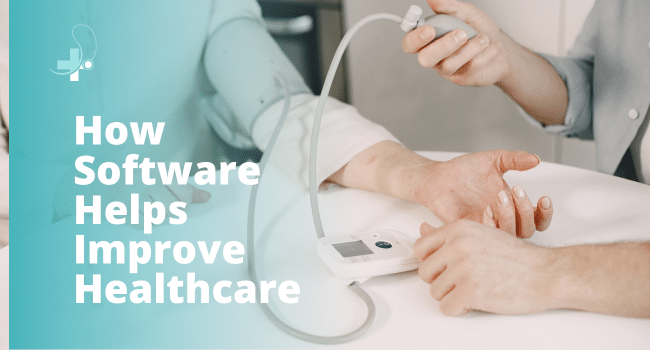Table of Contents
Software solutions have emerged as powerful tools for improving patient care, operational efficiency, and overall healthcare outcomes in the ever-evolving healthcare landscape. From enhancing workflow efficiency to supporting telemedicine, the software has revolutionized how healthcare organizations operate.
Software plays a significant role in transforming the healthcare industry. By leveraging technology, healthcare providers have several new options to improve how they serve patients. The following software solutions features and outcomes can drive positive change and revolutionize healthcare.
1. Enhancing Efficiency and Streamlining Workflows
Software solutions are crucial in improving efficiency and streamlining workflows within healthcare organizations. By automating manual processes and reducing paperwork, the software helps eliminate time-consuming tasks and reduce costs, allowing healthcare professionals to focus more on patient care.
The software enables seamless coordination among departments through features like electronic health records (EHR) and scheduling systems, which provide faster and more accurate information sharing. Workflow management tools optimize resource allocation, ensuring tasks are assigned and completed promptly. This enhanced efficiency improves staff productivity and reduces patient waiting times, leading to a more positive healthcare experience.
2. Improving Patient Engagement and Experience
Software solutions like AI Doctor contribute significantly to enhancing patient engagement and experience. Patient portals and mobile applications provide convenient access to medical records, test results, and personalized healthcare information. Patients can securely communicate with healthcare providers, schedule appointments, and request prescription refills through these platforms.
Additionally, the software enables remote monitoring and Telehealth doctors services, allowing patients to receive virtual consultations and follow-ups from the comfort of their homes. By empowering patients with self-management tools, educational resources, and personalized care plans, software promotes active participation in their healthcare journey, improving outcomes and overall satisfaction.
3. Facilitating Accurate and Secure Data Management
Effective data management is crucial for healthcare organizations to provide quality care and make informed decisions. Software solutions enable accurate and secure data management by digitizing patient records, eliminating paper-based systems prone to errors and loss.
With data encryption, access controls, and audit trails, the software ensures that patient information remains confidential and meets regulatory compliance standards, such as HIPAA. Furthermore, advanced data management tools enable efficient data storage, retrieval, and sharing, enabling healthcare professionals to access critical information at the point of care, leading to faster diagnoses, better treatment planning, and improved patient safety.
4. Enabling Effective Decision-Making through Data Analytics
Software solutions with data analytics capabilities empower healthcare providers to make informed decisions. By leveraging large volumes of healthcare data, the software can identify patterns, trends, and insights that help improve clinical outcomes, operational efficiency, and resource allocation. Advanced payer-provider analytics data software tools provide real-time dashboards and reports, offering a comprehensive view of key performance indicators and quality metrics.
This data-driven approach enables healthcare managers to identify areas for improvement, optimize workflows, and implement evidence-based practices. Additionally, predictive analytics can forecast disease trends, anticipate patient needs, and support proactive interventions, ultimately improving patient outcomes and driving better population health management.
5. Enhancing Communication and Collaboration Among Healthcare Providers
Software solutions foster effective communication and collaboration among healthcare providers, improving care coordination. Features like secure messaging platforms and integrated communication systems enable real-time and streamlined communication, ensuring that healthcare teams can quickly exchange critical information, consult specialists, and make well-informed decisions.
Collaboration tools facilitate multidisciplinary care, allowing professionals from different specialties to collaborate seamlessly, share insights, and collectively contribute to patient treatment plans. This enhanced communication and collaboration lead to better care coordination, reduces medical errors, improves patient safety, and enhances healthcare outcomes.
6. Supporting Telemedicine and Remote Patient Monitoring
Software plays a vital role in supporting telemedicine and remote patient monitoring, enabling healthcare organizations to extend their reach and provide care beyond traditional clinical settings. Telemedicine platforms allow healthcare providers to conduct virtual consultations, diagnose conditions, and prescribe treatments remotely.
This capability particularly benefits patients in remote areas or those with limited mobility. Additionally, software solutions enable remote patient monitoring, collecting, and analyzing real-time health data such as vital signs, medication adherence, and symptoms. Healthcare professionals can remotely monitor patients’ health conditions, detect early warning signs, and intervene promptly, improving chronic disease management and reducing hospital readmissions.
7. Ensuring Compliance with Regulatory Requirements and Standards
Software solutions help healthcare organizations navigate complex regulatory requirements and maintain compliance with industry standards. They provide tools and functionalities to meet regulatory guidelines such as HIPAA, GDPR, and Meaningful Use criteria. Features like access controls, audit trails, and data encryption ensure data security and privacy, protecting sensitive patient information.
The software also assists in automating documentation processes, ensuring accurate and complete record-keeping for compliance purposes. By leveraging software solutions tailored to regulatory requirements, healthcare businesses can mitigate risks, avoid penalties, and focus on delivering high-quality care while maintaining the trust and confidence of patients and regulatory authorities.
Software Improves Healthcare Outcomes for Patients
Healthcare business owners and management need to recognize the transformative impact that software solutions can have on the quality of care, operational efficiency, and patient experience. By embracing technology and implementing appropriate software solutions, healthcare organizations can enhance their efficiency, engage patients actively, ensure accurate and secure data management, and make data-driven decisions.
Conclusion
Embracing software solutions as integral parts of healthcare operations can improve outcomes, increase patient satisfaction, and create a more effective, efficient healthcare system. The software empowers effective communication and collaboration among healthcare providers, support telemedicine and remote patient monitoring, and ensures compliance with regulatory requirements.
Read more on KulFiy
